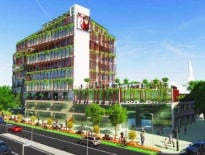Massport is right to be concerned about attempts to construct housing next to the exit from the state’s only container port. But trying to push their freight trucks into bus lanes is a step too far.
The long-running saga of the L Street Edison power station redevelopment took another turn last week when Massport officials filed a new statement with the state Executive Office of Environmental Affairs. The agency said it would only lift a deed restriction preventing housing on the site if developers Redgate and Hilco Redevelopment Partners paid it and gave them final approval over the site plan and covenant language for the project’s apartments and condominiums, and if the city swapped a plan for bus rapid transit lanes between South Boston and the Seaport for a mixed bus-freight lane.
Let’s be clear. High-end housing – particularly condominiums – often attracts high-powered residents who sometimes feel entitled to file complaints or even lawsuits against anything they feel detracts from their experiences. And a parade of tractor-trailers rumbling by 100 feet away from a park you’re trying to enjoy certainly fits that bill.
The Conley Container Terminal is a key regional logistics asset that must continue to operate smoothly regardless of the L Street property’s fate, and it’s only fair that the Redgate/Hilco project is designed to minimize conflicts between residents and cargo traffic, and its underlying legal framework contains steps to do the same.
But Massport must be stopped cold in any effort to cheapen much-needed and high-quality public transit.
The center-running bus lanes Boston and the MBTA have planned for infamously traffic-choked Summer Street are vital for South Boston. They promise to speed up and improve the jerky and sometimes unreliable bus trip hundreds of neighborhood residents already depend on to get to work. Furthermore, by offering a high-quality, reliable and fast connection to the Seaport and downtown, they will draw drivers out of their cars and get Summer Street moving again.
But if officials are pushed into swapping them for a lower-quality shared bus-freight lane, the public will be worse off.
Imagine waiting for your bus only to have a semi-trailer come barreling by, mere feet from you, spewing diesel exhaust. Imagine sitting on a bus waiting for a heavily-laden truck to accelerate away from a red light as cars in the other lane whiz by. Imagine taking one of the MBTA’s busier bus corridors and consciously choosing not to give its riders the shelters, subway-like level boarding and traffic priority they’re due.
That’s the kind of experience that tells bus riders they’re second-class. It won’t be fair to current riders and it certainly won’t attract new ones at a time when climate change demands we bring more drivers onto transit.
Massport’s trucks will be able to escape South Boston traffic just fine if the Summer Street bus rapid transit-like lanes are built. But agency leaders shouldn’t be allowed to extort favors at the everyone else’s expense.
Letters to the editor of 300 words or less may be submitted via email at editorial@thewarrengroup.com with the subject line “Letter to the Editor,” or mailed to the offices of The Warren Group. Submission is not a guarantee of publication.





